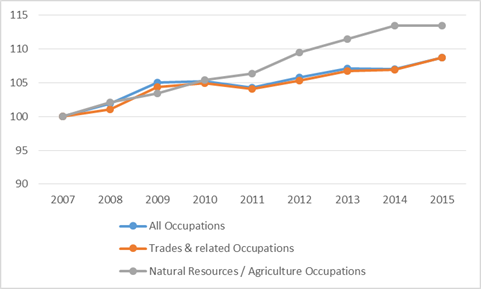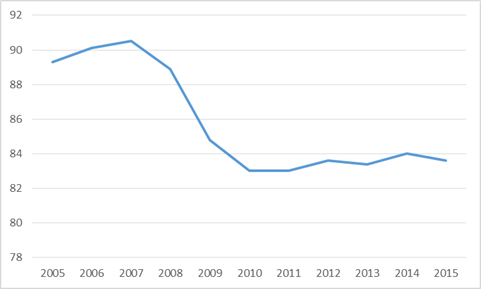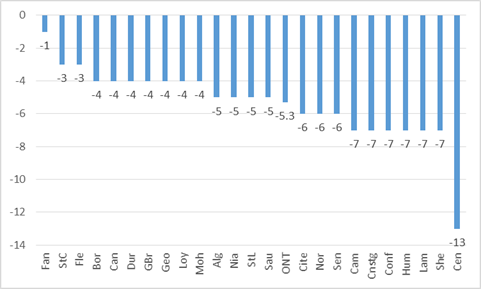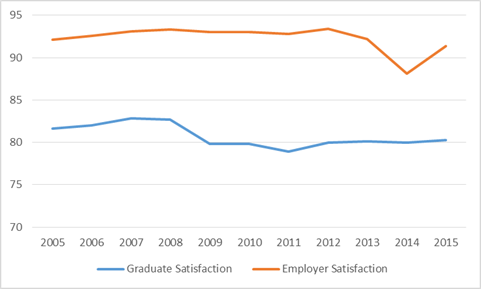I see that Ken Coates and Bill Morrison have just written a new book called Dream Factories: Why Universities Won’t Solve The Youth Jobs Crisis. I haven’t read it yet, but judging by the title I’d assume that it makes pretty much the same argument Coates made back in this 2015 paper for the Canadian Council of Chief Executives, which in effect was “fewer university students, more tradespeople!” (my critique of this paper is here)
With the fall in commodity prices, it’s an odd time to be making claims like this (remember when we had a Skills Gap? When’s the last time you heard that phrase?). There’s no evidence based on wages data that trades-related occupations are experiencing greater growth that those in the rest of the economy – since 2007, wages in these occupations have grown at exactly the same rate as the overall economy. True, occupations in the natural resource sector did experience higher-than-average growth between 2010 and 2014, but unsurprisingly they underperformed the rest of the economy in 2015. (see figure 1). More to the point, perhaps, these jobs aren’t a particularly large sector of the economy – if you exclude the mostly seasonal agricultural harvesting category, Canada only has about 265,000 workers in this field. That’s less than 1.5% of total employment.
Figure 1: Real Wage Increases by Occupation, Canada, 2007-2015, 2007=100
Source: CANSIM
More generally, though, the assumption of Coates and those like him is that in the “new” post-crisis economy college graduates have qualitatively different (and better) outcomes than university graduates, too. But a quick look at the actual data suggests this isn’t the case. Figure 2 shows employment rates 6-months out of college graduates in Ontario over the past decade. Turns out college graduates have experience more or less the same labour market as university students: an almighty fall post-Lehmann brothers and no improvement thereafter.
Figure 2: Employment Rates of College Graduates, Ontario, 2005-2015
Source: Colleges Ontario Key Performance Indicators
The decline in employment rates can’t really be described as a regional phenomenon, either. There is not a single college which can boast better employment rates today than it had in 2008: most have seen their rates fall by between 4 and 7 percentage points. The worst performer is Centennial College, where employment rates have fallen by 13 percentage points; one wonders whether Centennial’s performance has something to do with the very rapid growth in the number of international students it has started accepting in the last decade.
Figure 3: Change in Employment Rates 2008-2015
Source: Colleges Ontario Key Performance Indicators
So what’s going on here? Is there something that’s changed in college teaching? Is it falling behind the times? Well, not according to employers. Satisfaction rates among employers stayed rock-solid over the period where employment rates fell; and although there has been a slight decline in the last couple of years, the percentage saying they are satisfied or very satisfied remains over 90%. Graduate satisfaction fell a bit during the late 00s when employment rates fell, but they too remain very close to where they were pre-crisis.
Figure 4: Employer & Student Satisfaction Rates for College Graduates, Ontario, 2005-2015
Source: Colleges Ontario Key Performance Indicators
My point here is not that colleges are “bad” or universities are “better”. Rather, my point is that if you measure the success of any part of the post-secondary system exclusively by employment rates, then you’re basically hostage to economic cycles. Some parts of the cycle might make you look good and others might look bad; regardless, it’s largely out of your hands. So, maybe we should stop focusing so much on this. And we should definitely stop pretending colleges and universities are different in this respect.





 Tweet this post
Tweet this post
